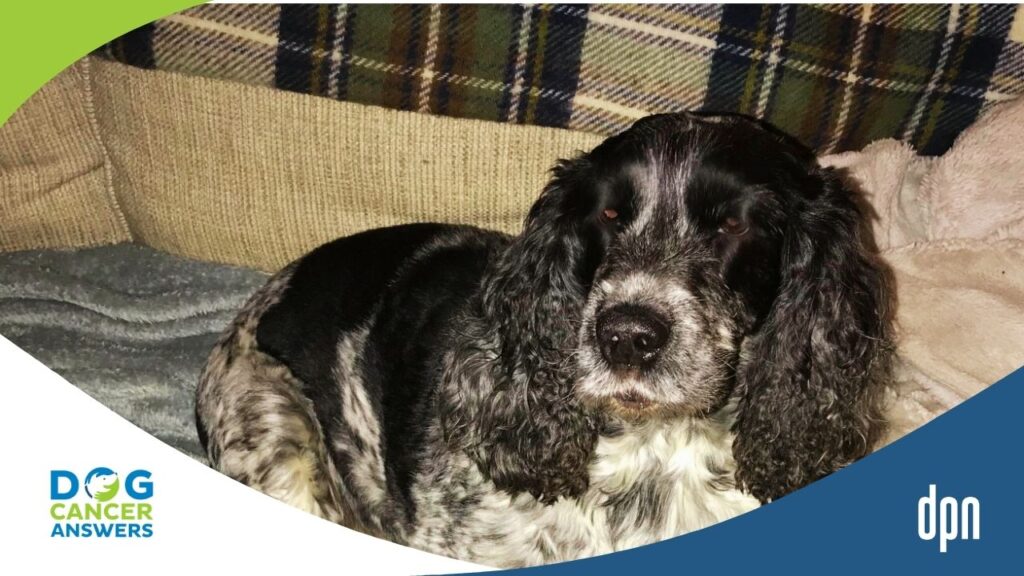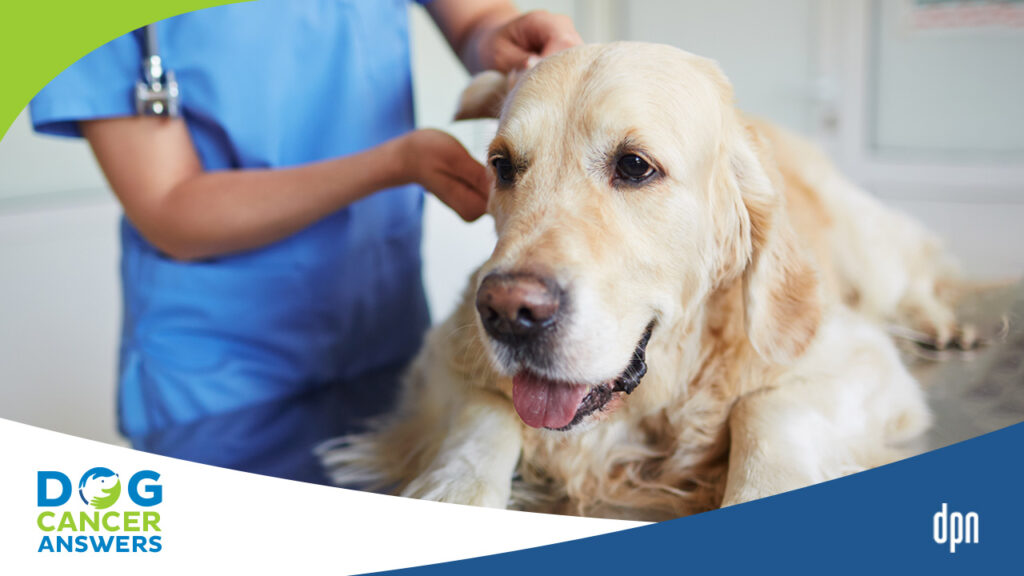[00:00:00] >> James Jacobson: Today on our special Exam Room Series, transitional cell carcinoma also known as TCC and what you need to know to help your dog.
[00:00:10] >> Announcer: Welcome to Dog Cancer Answers, where we help you help your dog with cancer. Here’s your host, James Jacobson.
[00:00:19] >> James Jacobson: Hello friend. Let me start off by saying, I’m sorry. I am sorry that you’re listening to this podcast.
[00:00:26] Sure. I know that it’s an odd thing for a host to say in a welcome message, but the fact that you are listening to my voice now probably means that you have a dog who has been diagnosed with transitional cell carcinoma, often abbreviated TCC. I’ve been there. And I know what it’s like to have a dog who has cancer.
[00:00:46] And I also want to let you know that you’re in the absolute best place because you are in good company. Unfortunately, cancer is the number one killer of dogs, but there is a lot of hope. Dogs do not have an expiration date stamped on their forehead. There are so many things that you can do to help your dog after you get a TCC diagnosis. Now I’m lucky. My veterinarian is Dr. Demian Dressler, author of the best-selling The Dog Cancer Survival Guide. He’s a renowned authority on full spectrum approaches to treating dog cancer. And today you can come into his exam room and listen to what he would tell one of his clients whose dog was diagnosed with transitional cell carcinoma.
[00:01:33] >> Dr. Damien Dressler: Transitional cell carcinoma is not one of the most commonly diagnosed cancers. What it is is it’s a tumor that usually grows from the inner wall of the bladder in towards the bladder interior. So it’s almost like if you had a balloon and there was something inside the balloon, if the balloon is the bladder wall.
[00:01:52] It can sometimes pop up in other portions of the urinary tract, like the prostate, if you have a male dog or in some other areas of the urinary plumbing, you could say. One of the problems with transitional cell tumors is that initially it will look like a urinary infection, very commonly. This is one reason why it’s quite important to have this checked out thoroughly.
[00:02:12] And why do I say that? Why does it look like a urinary infection? Well, from the outside, looking at the dogs with these tumors, it does look kind of like a urinary infection. So dogs and humans that have bladder infections, well, they display signs like increased urgency to urinate, urinating small amounts frequently, straining to urinate.
[00:02:32] These signs are connected with bladder wall inflammation. Bladder wall inflammation produces the sensation of having to urinate when you don’t really have to urinate. Inflammation can be caused by infection and that’s your most common, urinary tract infection. However, sometimes you’ll get inflammation of the bladder wall from the growth of a tumor, particularly in dogs that are older.
[00:02:54] If the urinalysis displays changes that are consistent with an infection like blood or white blood cells, or sometimes even bacteria, but it doesn’t go away in a permanent way with the use of antibiotics. It’s really important to dig deeper and to look for that tumor. Now we talk about management of transitional cell tumor in The Dog Cancer Survival Guide.
[00:03:16] This is one where it’s really important to utilize all of the different elements of the full spectrum approach that is all the tools that we can because conventional care, well, we have limited options. You can do surgery to remove these cancers, but many times they’ll pop up in areas that are hard to do surgery on to get all of the bad cells out.
[00:03:38] So we’re stuck having to have residual cancer cells in the body after these tumors pop up and after they’ve been operated on. And we talk about different ways of getting rid of those additional tumor cells again, in the book. But in short, it’s important to pay attention to things like diet and immunity to provide apoptogens and all of the other tools at our disposal to try to limit the growth of these cancer cells.
[00:04:01] Another thing that’s gaining in popularity these days is the use of low dose chemotherapy. That’s called metronomic chemotherapy. That’s also discussed in the book, but it’s useful to discuss this with your vet. And the reason why is because if we’ve got a cancer that kind of responds to chemotherapy, but not really, why go whole hog, so to speak with maximum doses, why not use a little bit and we combine that with other approaches so that we can avoid side effects and still do some good. And I think this is a cancer where a discussion of low chemo doses is really good to look at this with a discussion with your veterinarian.
[00:04:39] >> James Jacobson: If you’d like to hear more about dog cancer and what you can do to help your dog now, I encourage you to pick up a copy of Dr. Dressler’s book, which just happens to be the sponsor of today’s episode and this entire special Exam Room Series here on Dog Cancer Answers. The name of this best-selling book is The Dog Cancer Survival Guide: Full Spectrum Treatments to Optimize Your Dog’s Life Quality and Longevity.
[00:05:05] The authors are Dr. Dressler, who you just heard from, and Dr. Susan Ettinger, an oncologist in New York. And in a minute, I will tell you how to get their book at a discount. This book is considered the bible of dog cancer, and it covers so much information in an easy to understand, easy to reference guide. For example, the book covers everything that you need to know about conventional veterinary treatments, that’s surgery, chemotherapy, and radiation, including how to reduce their side effects.
[00:05:35] The most effective non-conventional options, including botanical nutraceuticals, supplements, nutrition, and mind, body medicine, and the book helps you to analyze the options and develop a specific plan for your own dog, based on your dog’s type of cancer, your dog’s age, your financial budget and your time constraints, as well as your personality.
[00:05:57] The Dog Cancer Survival Guide is available wherever fine books are sold, both online and in physical bookstores. It’s available either in paperback or as an e-book edition, and the e-book is under $10. The website to get either the paperback or the e-book is www.DogCancerBook.com, and you will save 10% if you use the promo code PODCAST, when you checkout you’ll save 10%. The website again, www.DogCancerBook.com. Use the promo code PODCAST for 10% off. That is www.DogCancerBook.com.
[00:06:33] I want to let you know that we have lots of free, helpful information on our podcast website. The URL is DogCancerAnswers.com. It’s where you can listen to or download our entire back catalog of episodes. It’s the best way to get the information that you need to help optimize your dog’s life quality and longevity.
[00:06:59] Do you have a question for a dog cancer veterinarian? Well, one of our veterinarians could answer your question on a future episode of Dog Cancer Answers. Please call our listener line and record your question. The telephone number is (808) 868-3200. That is (808) 868-3200.
[00:07:21] >> James Jacobson: Or visit our website at DogCancerAnswers.com. With dog cancer, you want to get relevant information as quickly as possible.
[00:07:30] So make sure you get the next episode of our podcast as soon as it’s released by subscribing to Dog Cancer Answers in Apple Podcast or your favorite podcast app. We’re also on Spotify as well as YouTube.
[00:07:45] That’s all for this episode in our Exam Room Series, I’d like to thank Dr. Demian Dressler for being our guest today. Until next time. I’m James Jacobson. From all of us here at Dog Cancer Answers and Dog Podcast Network, I wish you and your dog, a warm Aloha.
[00:08:06] >> Announcer: Thank you for listening to Dog Cancer Answers. If you’d like to connect, please visit our website at DogCancerAnswers.com or call our listener line at (808) 868-3200.
[00:08:18] And here’s a friendly reminder that you probably already know. This podcast is provided for informational and educational purposes only.
[00:08:25] It’s not meant to take the place at the advice you receive from your dog’s veterinarian. Only veterinarians who examine your dog can give you veterinary advice or diagnose your dog’s medical condition. Your reliance on the information you hear on this podcast is solely at your own risk. If your dog has a specific health problem, contact your veterinarian.
[00:08:42] Also, please keep in mind that veterinary information can change rapidly. Therefore, some information may be out of date.








